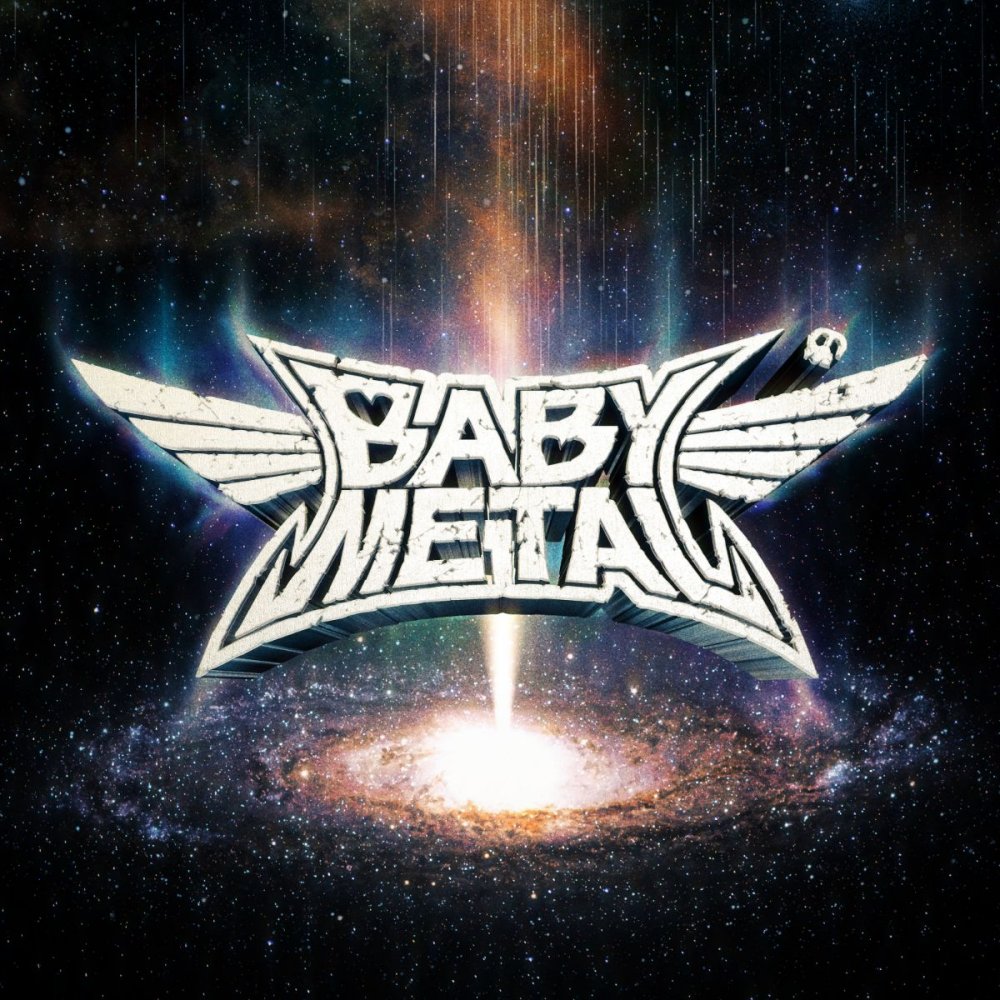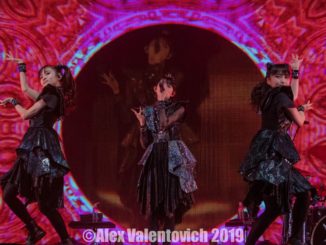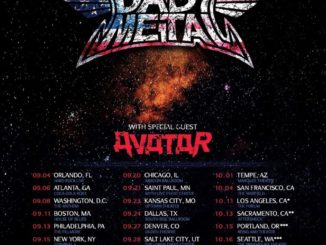
A Zen kōan doesn’t have to be deep, but a good one will startle us into new ways of thinking. Paradox is key. Sometimes it takes the collision of seemingly incompatible realities, and a moment of initial confusion, to emancipate us from a tired frame of reference.
Babymetal is paradox incarnate. The original “kawaii metal” band mashes up headbanging minor-key brutality with cutesy up-tempo Japanese idol-pop, capitalizing on both parents’ high-energy DNA but also risking self-contradiction, cartoonishness, and camp. On stage–Babymetal is a band built above all for live performance–they are three young women in pigtails and Gothic Lolita outfits. Their impeccably choreographed movements involve a classic-rock windmill arm but also the sweeps and gyrations of traditional Japanese dance. The backing guitar, delivered by mostly stationary figures in corpse makeup, is heavy, technical, digitally distorted, but the vocals are buoyant and cheery, veering only very rarely into metal-type screams. The lyrics are mostly Japanese, and ping-pong between angsty metal themes and light-hearted exhortations to get crazy and dance the summer away.
The band was formed in 2010, but it was in 2014 that it went worldwide with a self-titled debut album on the U.S. Billboard chart and a series of high-profile concerts alongside big names including Megadeth, Metallica, Slayer and Lady Gaga. At the time the average age of Babymetal’s members was less than 15, making them the youngest all-female act ever to take the stage at Budokan.
But this being the twenty-first century, it was YouTube that pushed Babymetal into the stratosphere. Their video for “Gimme Chocolate!”, a major single and a catchy showcase for the Babymetal brand, is at 107 million views and counting, pushing them into the company of “Despacito” and “Baby Shark.” Speaking of sharks: since 2014, Babymetal has occupied an oddly precarious position between overexposure (among metal fans) and invisibility (among everyone else). At any point the world could have moved on, leaving Babymetal and its patron deity the Fox God to the pop-culture equivalent of the clearance bin. In a world hungry for only the freshest click-bait, their destiny, as viewed in 2015 or so, seemed inevitable.
Which brings us to the new album Metal Galaxy, released worldwide on October 11. Metal Galaxy is the band’s third studio album, but in some important ways it represents a debut, as Babymetal shifts away from novelty into new worlds of hybrid-metal possibility. Its songs, many of which have been pre-launched online over the past year, as is the custom these days, are an eclectic bunch, inspired by the band’s relentless international travel and collaborations with a half-dozen or so western and Japanese artists. The vocals remain perky, the guitars are tight, and the contrasts that define the band’s flavor are as crisp as ever. Will Babymetal ever jump the shark? Perhaps. But Metal Galaxy represents a serious step toward the direction of serious artistry.
Collaborations are a major feature of the album. Alissa White-Gluz, vocalist for Swedish death-metal band Arch Enemy and Canadian outfit Agonist, sings over machine-gun bass-drumming and high-speed crunch on “Distortion.” Thai artist F. Hero brings rap influence (and some Thai words) to “Pa Pa Ya!!,” a spirited anthem that hit the Billboard charts in Japan and the United States this past summer. Tim Henson and Scott LePage from Dallas prog-rock outfit Polyphia bring a touch of “djent” and a pleasant virtuoso-guitar interlude to the ever-catchy “Brand New Day.” Grammy-winning guitarist Tak Matsumoto appears on “Da Da Dance,” a high-tempo electronic head-banger that in moments reminds one of the hybrid J-pop-lead guitar masterpieces of Marty Friedman.
International textures appear across the album, giving Metal Galaxy a breadth not seen in previous efforts. Swedish-Czech singer Jocke Brodén, frontman of Sabaton, chant-barks and leprechaun-growls on “Oh! Majinai,” a tune that also involves bagpipes and a foot-stomping beat that wouldn’t be out of place on a Dropkick Murphys’ album. “Shanti Shanti Shanti!” involves South Asian motifs, and “Night Night Burn!” has a decidedly Latin flavor and some fun conga-drum action. “In The Name Of” leans hard on the synthesizers at first but quickly veers into full Scandinavian death metal.
The internal dynamics of Babymetal have also evolved, following the departure of founding member Yui Mizuno (Babymetal name: “Yuimetal”) late last year. Although the parting seems to have been amicable, it remains unclear why Yuimetal left. The band has cited health reasons but there were also hints that Yuimetal might pursue a solo career, and neither the band nor Yuimetal seems inclined to dish. Rather than hire a full-time replacement, Babymetal’s corporate parent Amuse, Inc., has so far been content to cover Yuimetal’s spot with a rotating cast of part-timers known as the Avengers. Publicity photos for the new album feature the other two founding members, Suzuka Nakamoto (“Su-metal”) and Moa Kikuchi (“Moametal”) pensive and serious in flowing burgundy robes–a stark but perhaps temporary change from their usual kawaii-driven aesthetic. They look older. They are now in their early twenties.
For the first half-decade of Babymetal, the perennial question has been what, if anything, lies beyond the mash-up. Once you get past the novelty of juxtaposing J-pop with heavy metal, what remains? In some ways it’s still too soon to tell. U.S. audiences are still getting used to the idea of a band created and driven by a corporation, as opposed to the band members themselves. Purist metalheads have tended to be skeptical, even if ur-metalhead Rob Halford of Judas Priest has gone public with his love for Babymetal, and even if the mosh-pits on the current tour have been well-subscribed and vigorous.
But the rigor and breadth of Metal Galaxy suggests that Babymetal has happened upon something powerful, a cross-cultural and cross-generational hybrid capable of liberating metal from its ingrained habits. With its internationalism, its state-of-the-art crunch, and its irresistible catchiness, Babymetal’s latest affirms all that is cool about metal–loud guitars; high energy; mosh-pits, while also managing to put forth a tacit critique of metal’s shortcomings: its self-seriousness; its homogeneity; its relative lack of females.
Babymetal illustrates the power of paradox. It’s simultaneously heavy and light; goofy and serious; red meat and Dagashi candy; vacuous and rather brilliant. It’s genre-blurring, international, and catchy as hell.
Maybe Babymetal is just nonsense. But listen to Metal Galaxy and consider the possibility that maybe they are the future.



